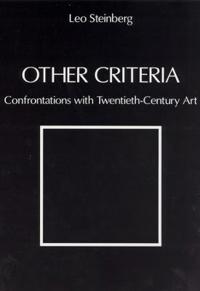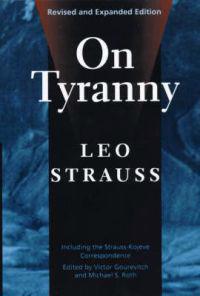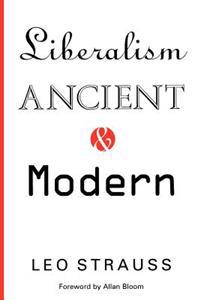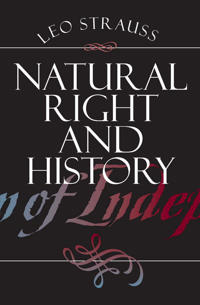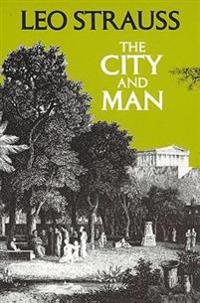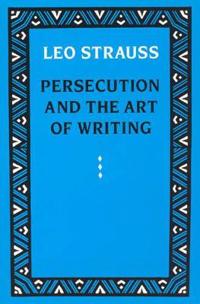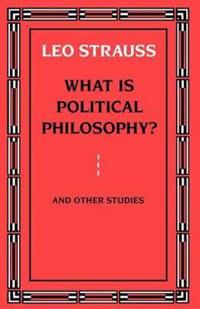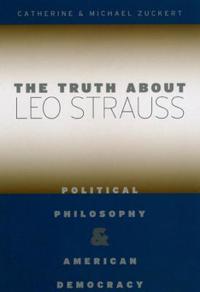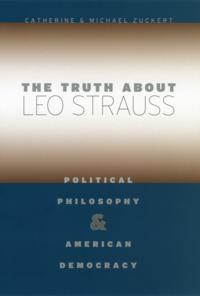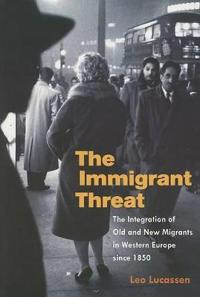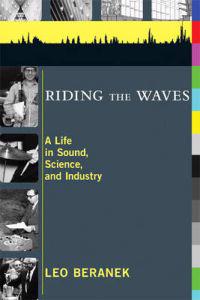Other Criteria (Pocket)
avLeo Steinberg
ISBN: 9780226771854 - UTGIVEN: 200711Leo Steinberg's classic "Other Criteria" comprises eighteen essays on topics ranging from "Contemporary Art and the Plight of Its Public" and the "flat-bed picture plane" to reflections on Picasso, Rauschenberg, Rodin, de Kooning, Pollock, Guston, and Jasper Johns. The last, which Francine du Plessi[...]
On Tyranny (Pocket)
avLeo Strauss, Alexandre Kojeve, Victor Gourevitch
ISBN: 9780226776873 - UTGIVEN: 200005This work is Strauss' reading of Xenophon's dialogue, "Hiero" or "Tyrannicus", in which the tyrant Hiero and the poet Simonides discuss the advantages and disadvantages of exercising tyranny. This edition includes a translation of the dialogue, a critique of the commentary by the French philosopher [...]
Liberalism Ancient and Modern (Häftad)
avLeo Strauss, Allan David Bloom
ISBN: 9780226776897 - UTGIVEN: 199512Liberal democratic thought in the 20th century is composed of two strands: the classical, which emphasizes human excellence, and the modern, which emphasizes individual freedom and social equality. In these essays, Strauss examines the ambiguous relationship between these tendencies, seeking to illu[...]
Natural Right and History (Pocket)
avLeo Strauss
ISBN: 9780226776941 - UTGIVEN: 196510In this classic work, Leo Strauss examines the problem of natural right and argues that there is a firm foundation in reality for the distinction between right and wrong in ethics and politics. On the centenary of Strauss's birth, and the fiftieth anniversary of the Walgreen Lectures which spawned t[...]
The City and Man (Pocket)
avLeo Strauss
ISBN: 9780226777016 - UTGIVEN: 1978-11"The City and Man" consists of provocative essays by the late Leo Strauss on Aristotle's "Politics, " Plato's "Republic," and Thucydides' "Peloponnesian Wars." Together, the essays constitute a brilliant attempt to use classical political philosophy as a means of liberating modern political philosop[...]
Thoughts on Machiavelli (Häftad)
avLeo Strauss
ISBN: 9780226777023 - UTGIVEN: 1995-10Leo Strauss argued that the most visible fact about Machiavelli's doctrine is also the most useful one: Machiavelli seems to be a teacher of wickedness. Strauss sought to incorporate this idea in his interpretation without permitting it to overwhelm or exhaust his exegesis of "The Prince" and the "D[...]
Persecution and the Art of Writing (Häftad)
avLeo Strauss
ISBN: 9780226777115 - UTGIVEN: 1988-10The essays collected in "Persecution and the Art of Writing" all deal with one problem--the relation between philosophy and politics. Here, Strauss sets forth the thesis that many philosophers, especially political philosophers, have reacted to the threat of persecution by disguising their most cont[...]
What is Political Philosophy? (Häftad)
avLeo Strauss
ISBN: 9780226777139 - UTGIVEN: 198810"What is Political Philosphy?" - a collection of ten essays and lectures and sixteen book reviews written between 1943 and 1957 - contains some of Leo Strauss's most famous writings and some of his most explicit statements of the themes that made him famous. The title essay records Strauss's sole ex[...]
The Truth about Leo Strauss (Pocket)
avCatherine Zuckert, Michael Zuckert, Catherine Zuckert
ISBN: 9780226993331 - UTGIVEN: 2008-04Is Leo Strauss truly an intellectual forebear of neoconservatism and a powerful force in shaping Bush administration foreign policy? "The Truth about Leo Strauss" puts this question to rest, revealing for the first time how the popular media came to perpetuate an oversimplified view of a complex and[...]
Truth about Leo Strauss
ISBN: 9780226993348 - UTGIVEN: 2015-06Is Leo Strauss truly an intellectual forebear of neoconservatism and a powerful force in shaping Bush administration foreign policy? The Truth about Leo Strauss puts this question to rest, revealing for the first time how the popular media came to perpetuate such an oversimplified view of such a c[...]
Film Restoration (Inbunden)
avLeo Enticknap
ISBN: 9780230230439 - UTGIVEN: 2013-09-13This is the first monograph-length work intended to enable readers with a humanities background and the general public to understand what the processes and techniques of film restoration do and do not involve, attempting to integrate systematically a discussion about related technological and cultur[...]
Adolescence and Adulthood (Pocket)
avLeo B. Hendry, Marion Kloep
ISBN: 9780230296404 - UTGIVEN: 2012-03-01Following the path from early adulthood to old age, this engrossing introduction offers students an insight into how psychologists have made sense of the significant markers in people's lives. The authors discuss stage theories, and ecological and systemic approaches to show how these ideas illumina[...]
Freudian Body, The: Psychoanalysis and Art (Övrig)
avLeo Bersani
ISBN: 9780231062190 - UTGIVEN: 1990-04-30Analyzes Samuel Beckett's novels, Mallarme's poetry, Pier Paolo Pasolini's film Salo, Assyrian palace reliefs, and writings by Henry James in terms of Freudian theories.[...]
Preserving the Press: How Daily Newspapers Mobilized to Keep Their Readers (Inbunden)
avLeo Bogart
ISBN: 9780231072625 - UTGIVEN: 1983-07-25George Gaylord Simpson: Paleontologist and Evolutionist (Inbunden)
avLeo F. Laporte
ISBN: 9780231120647 - UTGIVEN: 2000-09-05George Gaylord Simpson: Paleontologist and Evolutionist (Övrig)
avLeo F. Laporte
ISBN: 9780231120654 - UTGIVEN: 2000-09-05In 1978 the distinguished paleontologist George Gaylord Simpson published his autobiography, Concession to the Improbable, which gave the basic facts of his life but left more questions than it answered. Now Leo F. Laporte presents this absorbing intellectual study of Simpson's major areas of work.[...]
The Immigrant Threat (Häftad)
avLeo Lucassen
ISBN: 9780252072949 - UTGIVEN: 2006-01Since the 1980s, anti-immigrant discourse has shifted away from the "color" of immigrants to their religion and culture, focusing on newcomers from Muslim countries that are feared as terrorists and the products of tribal societies with values fundamentally opposed to those of secular Western Europe[...]
Configuration Space Method for Kinematic Design of Mechanisms, The (Övrig)
avElisha Sacks, Leo Joskowicz
ISBN: 9780262013895 - UTGIVEN: 2010-04-06This book presents the configuration space method for computer-aided design of mechanisms with changing part contacts. Configuration space is a complete and compact geometric representation of part motions and part interactions that supports the core mechanism design tasks of analysis, synthesis, an[...]
Riding the Waves: A Life in Sound, Science, and Industry (Övrig)
avLeo L. Beranek
ISBN: 9780262026291 - UTGIVEN: 2008-03-11Leo Beranek, an Iowa farm boy who became a Renaissance man--scientist, inventor, entrepreneur, musician, television executive, philanthropist, and author--has lived life in constant motion. His seventy-year career, through the most tumultuous and transformative years of the last century, has always [...]
Journey to Data Quality (Pocket)
avJames D. Funk, Richard Y. Wang, Yang W. Lee, Leo L. Pipino
ISBN: 9780262513357 - UTGIVEN: 2009-09-30Riding the Waves (Häftad)
avLeo Beranek
ISBN: 9780262513999 - UTGIVEN: 2010-03Leo Beranek, an Iowa farm boy who became a Renaissance man--scientist, inventor, entrepreneur, musician, television executive, philanthropist, and author--has lived life in constant motion. His seventy-year career, through the most tumultuous and transformative years of the last century, has always [...]
Comrade and Lover: Rosa Luxemburg's Letters to Leo Jogiches (Pocket)
avRosa Luxemburg
ISBN: 9780262620376 - UTGIVEN: 1979-01-01

